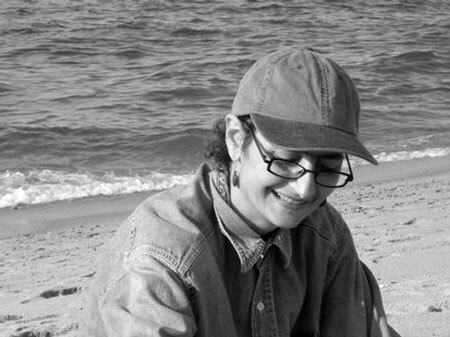Councilmember Robert Jackson chairs hearing Friday for measure pushed by Christine Quinn
The late Dominque Ghossein was unable to get domestic partner heath benefits from the employer of her partner, Leslie Thrope. Ghossein died in 2003 and city legislation is named for her.
A City Council bill that could materially advance the cause of gay partner rights in New York than has ever been done before gets its second and last hearing Friday, February 27 at 10 a.m.
While the Equal Benefits Bill, also known as the Thrope-Ghossein bill, in honor of a couple tragically affected by lack of domestic partner benefits, has a veto-proof majority of 38 co-sponsors in the 51-member council, Mayor Michael Bloomberg is waging a concerted campaign to portray the legislation as an illegal usurpation of his powers, despite having supported it when he began his campaign for mayor in 2001.
“He doesn’t support domestic partners,” said City Councilmember Christine Quinn (D-Chelsea) at Tuesday night’s rally against President George W. Bush’s endorsement of the Federal Marriage Amendment. “It’s ridiculous.”
Bloomberg gave domestic partner benefits to employees of his financial services firm, but instituted them only the year before he ran for mayor. He claims it is illegal under state law for a municipality to award a contract based on anything other than getting the best service or product at the lowest price, but Council lawyers dispute that, saying state law allows cities to set some minimum workplace conditions.
Bloomberg signed the Living Wage Bill last year, requiring some types of contractors to pay more than minimum wage to their employees. He has refused to explain how that law is legal and the Equal Benefits Bill is not.
The New York bill is very similar to legislation that has been law in San Francisco since 1997. It would require all those who contract to provide goods or services of more than $100,000 for the city to provide the same benefits to the domestic partners of their employees as they do for the spouses of their workers. It applies to all contractors, whether or not they are based in the city.
Contractors outside of NYC are only required to deal equally with those employees who work directly on the contract with the city. The San Francisco law is responsible for more than 80 percent of the corporate domestic partner benefit plans in the country because firms outside that city who did business with it eventually covered all employees rather than just those who worked on that city’s contracts.
Firms or organizations that do not provide spousal benefits would not be required to provide domestic partner benefits. In extending domestic partner benefits to employees, employers are not required to spend any more on the benefit than they do for a spousal benefit. Domestic partners can be of the same or opposite sex.
A November hearing on the bill was a love-fest, with no opponents testifying other than representatives of the Bloomberg administration, they were unable to adequately defend the legal argument they presented against the bill. The Contracts Committee heard the story of Leslie Thrope at that hearing, whose dying partner Dominque Ghossein was unable to get domestic partner benefits through Thrope’s employer, the SEIU 32B-J Legal Fund, a city contractor. Committee chair Robert Jackson (D-Upper Manhattan), moved by the story of the women, named the bill in their honor.
At Friday’s hearing, Quinn expects more opposition, but none have notified the Council of their intent to testify. A Bloomberg official said at the last hearing that she had talked to the head of Catholic Charities and that he would have problems with the bill on religious grounds. Monsignor Kevin Sullivan, executive director of Catholic Charities, did not return a call from Gay City News soliciting the group’s stance on the bill.
The Salvation Army, which just got a $1.5 billion bequest from the McDonald’s hamburger heiress, has indicated that it may forgo its city contracts rather than offer domestic partner benefits. The Army is already in trouble for requiring a new religious test of all its employees, something that is also illegal for city contractors and violates state and city human rights laws.
Anyone may testify at the hearing, but all those who have signed up so far are strong supporters. They include State Comptroller Alan Hevesi, people in gay and non-gay domestic partnerships, an insurance expert from the Commission on the Public Health System, the regional director of the United Auto Workers, Bishop Catherine Roskam of the Episcopal Diocese of New York, Rabbi Valerie Lieber of Temple Israel in Jamaica, Queens, and Terry Boggis of Center Kids, the family program of the Lesbian, Gay, Bisexual and Transgender Community Center.
While Quinn said that she expects opponents to show up, there is speculation that they are just relying on Bloomberg to stop the bill through a veto or legal action.
Since San Francisco paved the way for equal benefits bills of this type, they have been enacted by Los Angeles, Seattle, Oakland, Minneapolis, some smaller cities, and the state of California, according to the Empire State Pride Agenda which has lobbied the Council on the bill as part of the Equal Benefits Coalition. A Portland, Maine contractors bill was partially invalidated recently by a court that ruled the city could not require health benefits covered under federal ERISA insurance laws, though it could require other kinds of domestic partner benefits be provided by contractors, including those with religious affiliations.
For more information about the hearing, call Carin Mirowitz in Quinn’s office at 212564 7757, x 105. For more detailed information on the bill and its sponsors, go to the Pride Agenda’s website at prideagenda.org.



































